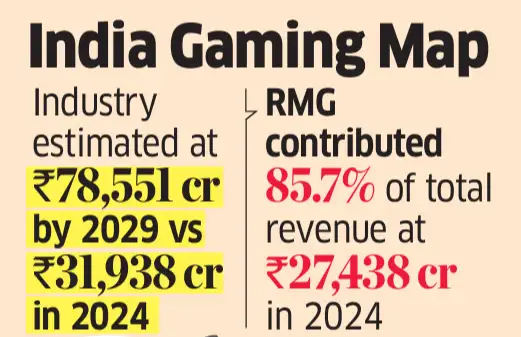The cabinet approved legislation that will impose a blanket ban on online games with a monetary component, noting they lead to suicides due to financial losses besides addiction among children and the youth.
The legislation, which proposes imprisonment and penalties for violations, brings the hammer down on online money gaming, irrespective of whether based on skill, chance or both.
Representatives of the Rs 27,438 crore online money gaming sector said they were shocked and feared the prospect of being shut down. Dream11, MPL, Games24X7, Winzo, Zupee and publicly listed Nazara Technologies, which acquired stakes in Classic Rummy and PokerBaazi, could be among those hit by the legislation.
 ETtech
ETtech
The bill also cited sovereign threats such as cybercrime, terror incitement and financing as well as money laundering through digital wallets and cryptocurrencies.
For entities running money gaming services, the bill has proposed up to 3 years of imprisonment, or a fine of up to Rs 1 crore, or both. Banks and financial institutions who engage in or facilitate the transaction of funds for money games will face the same penal charges. Meanwhile, advertising such games would attract jail term of up to two years, and a fine of up to Rs 50 lakh, or both.
The Promotion and Regulation of Online Gaming Bill 2025 was drafted by the Ministry of Electronics and Information Technology (MeitY). It’s expected to be presented in Parliament on Wednesday by Union minister of electronics and information technology Ashwini Vaishnaw. It may be referred to a select parliamentary committee.
The bill seeks to promote the burgeoning discipline of e-sports in line with global trends, along with gamification and the animation, visual effects, gaming and comics (AVGC) sector. It also proposes to create a national authority to regulate the overall gaming industry.
“The government has no issues with online gaming. The issue is only with online money gaming,” said an official. The government recognises that “India could become the gaming capital of the world” and legitimate games without any money aspect will be promoted, the official said. “The industry was playing on the grey area that existed between games of skill and chance. If betting and gambling is not allowed in the physical world, how can it be permitted in the online space.”
The Centre has listened to industry voices over several occasions, the official said, countering the contention that feedback from companies was not heard before the bill went to cabinet.
The cost to society was taken into account.
“Yes, thousands of jobs may be lost, but the future of lakhs of people will be saved,” the official said.
The bill says online money games have led to socioeconomic and psychological consequences, posing a risk to public welfare. It seeks to bar such games from online portals and general user participation besides curbing endorsements by celebrities and influencers.
According to a joint report by WinZO Games and the Interactive Entertainment and Innovation Council, the sector has received Rs 25,896 crore, or $3 billion, in foreign direct investment. India’s estimated 591 million gamers account for a fifth of the global gaming population, with 11.2 billion mobile game downloads annually.
 ETtech
ETtech
“The bill is extremely problematic, prime facie unconstitutional and not sustainable in law,” said Jay Sayta, technology and gaming lawyer. “‘Betting and gambling’ as well as ‘amusements and entertainments’ are squarely state subjects and parliament has no legislative competence to enact laws on the subject, except under Article 252 of the constitution where two or more state legislatures expressly pass a resolution and allow parliament to enact a law on the subject.”
Kazim Rizvi, Founding Director of public policy think-tank The Dialogue, pointed out the fiscal importance of the sector. “GST revenues from online gaming surged by 412% in just six months to Rs 6,909 crore, and TDS collections crossed Rs 1,080 crore in FY24,” he said.
E-sports, social gaming
On the other hand, the bill has clearly defined online social games and e-sports. Online social games are those which “don’t involve staking of money, or other stakes, or participation with the expectation of winning in return of money or other stakes and is offered solely for entertainment, recreation, or skill-development purposes,” according to the bill. E-sports are those involving “organised competitive events between individuals or teams, conducted in multiplayer formats governed by predefined rules’ and are recognised by the national Olympic and Paralympic committees.”
For both these categories, it has encouraged the development of indigenous technologies, responsible game design, and the use of emerging technologies such as artificial intelligence and AR/VR (artificial reality, virtual reality). The move will see India become a global hub for creative and cutting-edge digital gaming content, the bill says.
“The law reportedly seeks to criminalise all online money games that don’t qualify as e-sports or online social games. This could inadvertently cover well-recognised protected formats,” said Arun Prabhu, partner and co-head, digital and TMT at law firm Cyril Amarchand Mangaldas. He explained that the distinction is based on whether money is staked and winnings are expected.
The bill reportedly also proposes a new blocking mechanism, expanding the scope of this beyond the existing IT Act’s Section 69A.
“Whether these widely worded restrictions and powers will be enacted in their current form, or survive judicial scrutiny, remains uncertain,” Prabhu added.
Online gaming platforms had hoped for a favourable judgment by the Supreme Court in a case concerning the applicability of goods and services tax (GST) on online games as part of a Rs 2.5 lakh crore dispute. One of the largest tax cases in India’s legal history, it centres on the interpretation of Rule 31A of the Central Goods and Services Tax (CGST) rules. This mandates 28% GST on the face value of bets. Last week, the top court reserved its judgment on the matter.
However, the government has argued the bill is necessary since judicial interpretations on the matter have been inconsistent, resulting in legal uncertainty and enforcement paralysis. The need for a national regulator arose due to the challenges in cross-border and inter-state operations considering the ‘regulatory grey zone’ in which the sector has operated so far.
Inter-departmental meetings on the bill took place on Tuesday among officials from MeitY and the Prime Minister’s Office, sources said. MeitY had earlier implemented a framework for online gaming through amendments to the Information Technology (Intermediary Guidelines and Digital Media Ethics Code) Rules, 2021.
The cabinet’s approval of the online gaming bill is a decisive step that finally separates e-sports and social games from wagering-led money gaming, said Rajan Navani, founder and CEO, JetSynthesys.
“The government’s intent to promote esports and social video gaming while prohibiting online betting and curbing its advertising is clearly to protect the Indian consumer,” he said.
